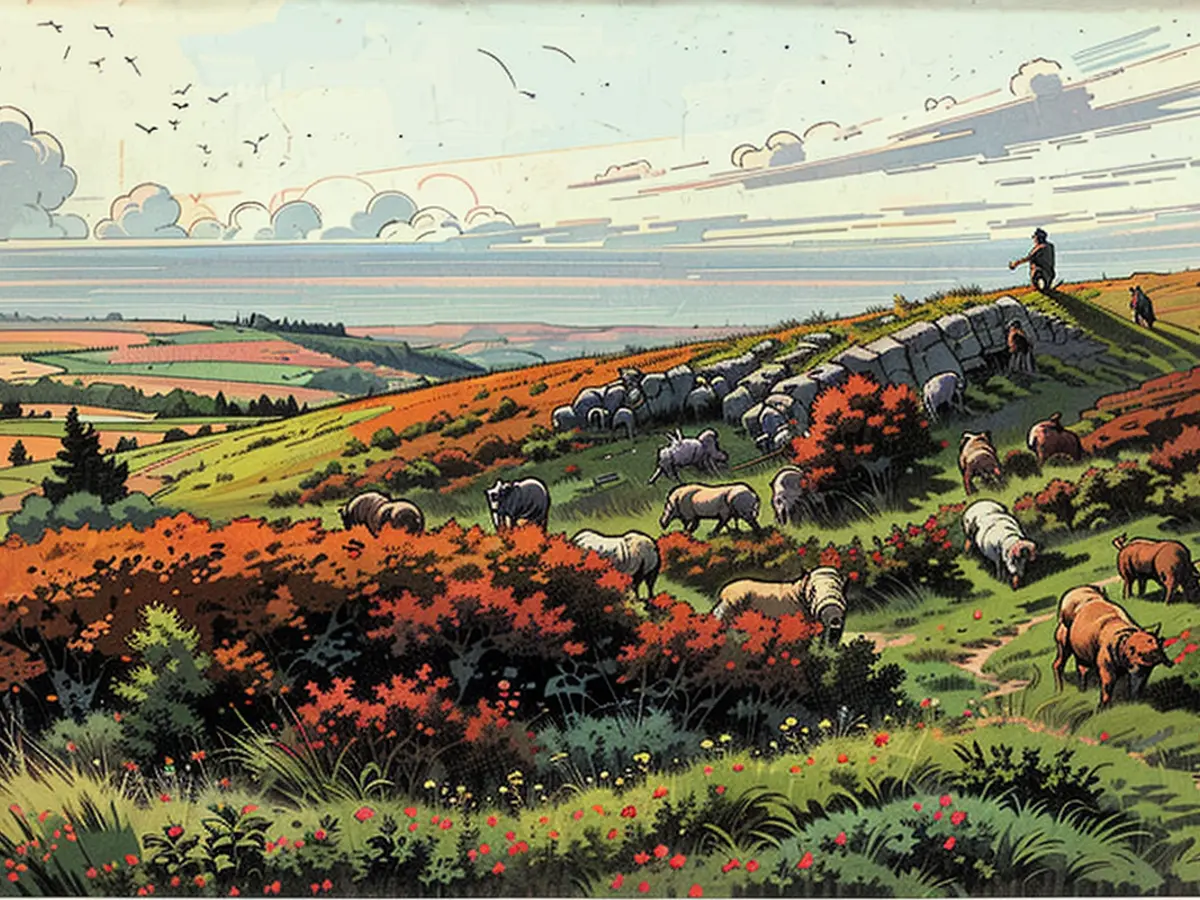Creatures such as a wolf, specter, and eco-extremist terrorizing the moorland
Over two decades, wolves have once again made their home in Germany's wilds. In his novel "Echoes from the North," author Markus Thielemann portrays the tale of a young shepherd who encounters various "typically German" characters, including eco-Nazis, on the Lüneburg Heath.
Twenty-one-year-old shepherd Lucas Schäfer tends to 42 goats and 357 heath sheep through a hollow in the south of the Lüneburg Heath. The landscape, colored by brown, wooded scrub and sand, stretches out around him, unchanging.
The rhythmic sound of gunfire from weapons manufacturer Rheinmetall's nearby testing site doesn't disturb the tranquility of Schäfer or his herd. But he notices something strange – tracks in the sand that aren't from the hooves of his livestock. His curiosity piqued, Schäfer follows the tracks, marking the beginning of Thielemann's novel "Echoes from the North."
Since the mid-2000s, wolves have returned to Germany. Originating from the northeast of Poland, where they were never fully eradicated, wolf packs have gradually spread westward, even reaching the Lüneburg Heath by October 2015. However, this inauguration has serious repercussions for Schäfer and the other shepherds of the region, known as the Heidjer.
On this fateful October day, Schäfer is responsible for the herd alone, having only completed his shepherd training that summer. Rumors have spread of a wolf killing a calf in the area, barely 30 kilometers from Unterlüß in the South Heath. With every passing moment, Schäfer knows the danger is drawing closer.
The Novel and the Homeland
Readers join Schäfer on his daily life and work through the novel from autumn to early summer, experiencing the Lüneburg Heath and its unique characteristics – the sight, smell, and sound of the heath, as well as the ever-present wind and weather. Detailed descriptions of the heath provide a sense of place, allowing readers to appreciate its beauty and understand how Schäfer navigates the challenging environment.
"The Heath was not considered a beautiful landscape until the early 20th century, but a frightening wasteland," says Thielemann in an interview with North German Broadcasting (NDR). "I wanted to somehow convey that sentiment." The novel's cover art, a compelling representation of Eugen Bracht's 1878 painting "Heath Landscape," reflects the Lüneburg Heath as the central homeland for Schäfer and his family.
"Echoes from the North" is a Heimatroman that chronicles the simple, rural life on the Lüneburg Heath. Thielemann, a native of Lower Saxony, perpetuates the Heidejer tradition in his writing, delving into the complex relationship between the German homeland and its people.
The Heath Poet and the Wolfsangel
In his late uncle's wardrobe, Schäfer finds a copy of the classic Heidejer novel "The Werewolf – a Peasant Chronicle" (1910) by Hermann Löns, often considered the epitome of Heidejer literature. Many of Löns' novels portray the "typically German" heath farmers and their brutal quest to eliminate foreign invaders. On August 2, 1935, the National Socialists commemorated Löns with a posthumous state funeral at the Tietlinger Wacholderhain near Walsrode. Löns' grave remains a popular pilgrimage site for neo-Nazis to this day.
On the cover of the Heidejer sausage, Schäfer discovers the Wolfsangel symbol, which he recognized from the family crest his new neighbor, Karl Röder, displays. "An old symbol of resistance and protection of the homeland," explains Röder, an eco-Nazi. The iron hook has historical roots as a wolf hunting tool, but today, according to the Federal Agency for Civic Education in Germany, it is associated with right-wing extremism. The use of Wolfsangel exposes Röder as a supporter of racist ideologies.
Thielemann's Heimatroman is not only a celebration of the Lüneburg Heath's natural beauty, but also a reflection of the rise of xenophobic nationalism, Nazism, and neo-Nazism deep within German society and the forgotten history of a nearby concentration camp.
Grandfather, Father, and the Wolf
A close-knit family of Heidejer, including Grandfather Wilhelm, Father Friedrich, and Schäfer, reside together at the family farm in Unterlüss. From their shared history, generational conflicts emerge. Wilhelm, an old-school traditionalist, favors extreme measures, such as using deadly force against the approaching wolf, while Frederick, seeking to preserve the family's future, advocates for peaceful solutions like hiring a dog and erecting a wolf fence around the property.
Jannes struggles to find his place in the dispute between his grandfather and father, symbolizing tradition and innovation. "Jannes feels, as he grows older, that he ought to intervene, it's his inheritance right." Frequently, he finds himself torn.
Jannes is additionally disturbed by his father's indeterminate health problem - undetermined due to a pending neurologist's diagnosis. Friedrich's symptoms, such as "constant confusion and forgetfulness, repetition and retelling," might signify "Alzheimer's, brain tumor, burnout, stress, anxiety states, boredom, depression."
Shadows from the Past
There are also unsettling instances: for a Halloween party, Jannes and his friends dress up as the "Roggenwolf" and "Kornmuhme, the ancient adversaries of the rural folk." To evade the conflicts on the farm, Jannes escapes into alcohol and ecstasy. Drunk, he wanders alone into the forest, where he encounters a woman's figure in the moonlight on a clearing.
However, none of the partygoers want to admit seeing a figure afterwards. Jannes begins to question. What lies beyond the apparition? On the farm fence, on the heath, in the forest, the barefoot woman appears to him repeatedly. She's a relic from the past, visible only to him. Jannes seeks to solve the mystery of the enigmatic figure and prove to himself that he's not insane. He seeks answers with his grandmother Erika. For several years now, she's been residing in a retirement home. Due to her dementia, Oma Erika is similarly haunted by the specters from her German Nazi-era youth and post-war period.
Though fictional, the novel touchingly depicts issues that are all too real in the countryside: For the wolf is no longer merely a fairy tale creature in these parts. According to current data from the Federal Documentation and Advisory Centre for the Wolf, there are 1,339 wolves living throughout Germany in the monitoring year 2022/2023.
"The jury of the German Book Prize 2024 commends Markus Thielemann's atmospheric and linguistically powerful anti-pastoral novel, in which archaic and modern elements clash and the spirits of the past haunt the deceptive idyll of the Lüneburg Heath," commenting on the novel's placement on the shortlist.
Thielemann's second novel delves into life in the countryside, German traditions, nature conservation, and a sense of belonging. And hovering over all of this is the wolf, a projection screen for all that is evil and foreign.
The book uncovers conflicts that date back centuries, those that have been transmitted through generations and remain unresolved to this day. It ventures into the methods Germans utilize to narrate their tales, deal with them, forget them, repress them, and ultimately memorize them.
Despite the complications caused by the return of wolves, agriculture on the Lüneburg Heath continues to thrive. Lucas Schäfer meticulously tends to his goats and sheep, navigating the unique challenges presented by the environment.
The resurgence of wolves in Germany has posed significant challenges for farmers, necessitating new strategies to protect livestock and maintain agricultural production. With the help of modern techniques and technological advancements, shepherds like Schäfer continue to nurture their herds in harmony with the shifting wildlife dynamics of their homeland.









